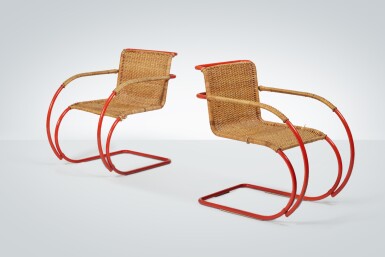Design
Design

Zen by Design: Property from an Important New York Collection
Ludwig Mies van der Rohe
Pair of Armchairs
Lot Closed
October 20, 05:31 PM GMT
Estimate
10,000 - 15,000 USD
Lot Details
Description
Zen by Design: Property from an Important New York Collection
Ludwig Mies van der Rohe
Pair of Armchairs
designed circa 1927
model no. MR 20
painted tubular steel, rattan
32 5/8 x 22 3/8 x 31 1/2 in. (82.9 x 56.8 x 80 cm) each
Eva Ottlinger, Nina Stritzler, and Ghenete Zelleke, Against the Grain: Bentwood Furniture from the Collection of Fern and Manfred Steinfeld, Art Institute of Chicago, Chicago, 1993, p. 105
Ludwig Glaeser, Ludwig Mies van der Rohe: Furniture and Furniture Drawings from the Design Collection and the Mies van der Rohe Archive, New York, 1977, n.p. (for period photographs of the model)
Clement Meadmore, The Modern Chair: Classics in Production, Van Nostrand Reinhold Company, New York, 1975, pp. 38-41
Peter Noever et al., Der Preis der Schönheit: 100 Jahre Wiener Werkstätte, Hatje Cantz, Ostfildern, 2003, pp. 8 and 275
Helmut Reuter et al., Mies and Modern Living: Interiors, Furniture, Photography, Hatje Cantz, Ostfildern, 2008, p. 90, 94 (for a period photograph of the model), 95, 107, 126, 134 (for period photographs of the model)and 138-139 (for a period photograph of the model)
The final director of the Bauhaus and a pioneer of the International Style, Ludwig Mies van der Rohe was a true leader in functional, modern design. His architectural background supported his strong belief that materials should reflect structural simplicity. Mies favored tubular steel for its flexibility, airiness, and industrial manufacture possibilities. Using a cantilever construction, Mies produced chairs which relied on a curved, continuous form. The resulting seating exuded sophistication while only being comprised of essential geometric lines.
The MR 20 model epitomizes the architect’s design principles. Lily Reich, a close collaborator, employee, and teacher under Mies at the Bauhaus, is believed to have revised the MR 20 design. Reich had a skill for juxtaposing materials, thus the MR 20 model was outfitted in a variety of fabrics and upholstery methods. The present lot was manufactured with woven Indonesian rattan on the seat and armrests, with a red varnish covering the tubular steel frame. Mies trusted Reich’s opinion on his furniture designs wholeheartedly and relied on her expertise to design his early exhibitions. At the Berlin Building Exhibition in 1931, Mies and Reich introduced new elaborations of their previous 1927 chair designs.
